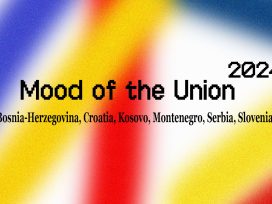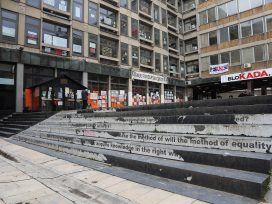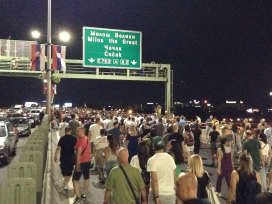How to respond “in our language” to the article by the Croatian writer Slavenka Drakulic, “Why I have not returned to Belgrade”, other than: Come Slavenka, we miss you. Or: Just forget it!
Belgrade is still an enticing multiethnic city, a real paradise for writers. And it never bears a grudge. It’s an open, free city. That’s why I call it The Principality of Belgrade. Admittedly, it’s a little run down, dirty and poor; wounded, in the heart of Europe, by the bombs containing depleted uranium that bring death to our children. The same children who stand in humiliating long queues in front of foreign embassies, waiting for their visas.
Belgrade, in which we too are slowly but surely poisoned to a “cultural death”. But let’s be honest, this is an illness of modern times, of our global village. Only, in the Balkans, it’s more visible and more audible. The Balkans, where there isn’t just a “surplus of history” but also a surplus of emotions, a surplus of love and hate. And also pain, in Duras’ sense, and sorrow.
Slavenka Drakulic, as an artist who has lived in the West for a long time, must be well aware that the modern world doesn’t love life. And that it loves and respects the Other less and less. Especially some poor, wild cousin who took it into his head that he should be his own master, free to decide upon his destiny. Can we be rescued by the arts, by beauty and truth? After everything we did to each other, after all the migrations, separations, wars and crimes?
Belgrade is a city of beautiful women and interesting men. When I asked a friend of mine from Budapest, a writer and a professor of literature, a Hungarian and a Catholic, what she liked about Belgrade, she replied: “Belgrade is an erotic city where I always feel like a woman.” Belgrade, standing between worlds, the Orient and the Occident, where two beautiful rivers join, the Sava and Danube, gives people that feeling for sorrow, for pleasure. It gives them a great sensibility for the arts, for beauty, freedom and truth. That is why I call it the Principality of Belgrade.
Belgrade isn’t a boring and sterile city. It reminds me of dissolute Mediterranean cities where the rule applies “live now and die young”. In this city, both foreigners and natives and that horde called tourists have great fun. Young Slovenians have taken possession of the city. They need no visas. On weekends and holidays they enjoy themselves with our children in the floating pubs on the Danube or at private parties. Even if it is run down and poor, and somewhat frustrated, Belgrade has remained a noble, hospitable city. Maybe it treats its own people worst.
After all that has happened to it, Belgrade is recouping strength, getting ready to become a “golden city” again, a Mecca for artists and athletes. This gives it an extraordinary charm. Let’s not fool ourselves: the Croatian writer Slavenka Drakulic knows very well that Belgrade was and still is the only metropolis in the Balkans. That it has always been an open and free city. That’s why I love it and call it the Principality of Belgrade.
The Principality of Belgrade, where both sinners and saints can live. Including a saint such as the Croatian writer Slavenka Drakulic.
We’ve lived through many things in the twenty years since the fall of the Berlin Wall and the fall of the former Yugoslavia. The Balkans, where all those years human life was the cheapest commodity! We were only a military firing range for various dominating forces, a dummy for experiments.
We will survive the black and white world of Slavenka Drakulic and the epithet “dirty and evil Serbs”, and we will survive all the evil that befallen us. If we and our children cannot travel to Europe, the world will come to visit us. I suggest that our children, born in the 1990s, be offered the right and the privilege to choose where they can study. Then they can start asking us, their parents, even more difficult questions than: “Why are they queuing for visas in front of foreign embassies?” In God’s name, those children, those young Serbs, whom the author Slavenka Drakulic saw at Mariahilferstrasse and at the conference in Vienna, were not even born at the beginning of the 1990s when we began our wars! That part of her article smells of hate speech, of racism. Someone who doesn’t know is not guilty! Someone who doesn’t know cannot be held responsible!
The Principality of Belgrade has, in all these years, stoically accepted the punches and the nauseating talk by various provincial intellectuals, authors who in all their books, articles, and interviews deliberately forget that nations are not guilty, cities are not guilty… That is why I wrote this article. All of them have been – are still – trying persistently to find their faces reflected in the mirrors of Belgrade. In broken mirrors, nothing can be seen clearly. Their books have been sold and printed in Belgrade, their articles and interviews published in Belgrade newspapers. And I am glad of it, because I defend Belgrade as an open and free city. A city in which it doesn’t occur to anyone to burn books, as they burned ours at the beginning of the 1990s.
To accuse Belgrade of being the only sinner, of being solely responsible for the bloody downfall of the former Yugoslavia, is, to put it mildly, a cowardly act. The reality is not appreciated, the truth not honoured. It is not befitting of an intellectual, and above all an artist and her engagement in the time in which she lives. Let me make myself clear: I have no intention of defending and giving amnesty to either our criminals or theirs! Nor to the crimes committed by the international community. It takes at least two to love and to fight a war. Three is exciting company worth the “surplus of history”.
The truth can cure us. And as it is in life, the truth is not only on one side. One’s thougths and intentions are typically determined by the place from which one observes an event or a phenomenon. To exchange the Berlin Wall for the Belgrade Wall, as the Croatian author Slavenka Drakulic does in her article, is human, intellectual and political deceit. Her article is ideologically oriented, politically biased and instrumental.
To assume for oneself the divine position, the position of the one and only judge, the one and only interpreter of history, and the one and only guardian of the human conscience, is the position of a presumptuous, irresponsible and narcissistic person. Or of a mercenary.
That is the reason why I read the article by a talented and scandalous Croatian master and gifted writer solely as a sniper shot, as another unsuccessful attempt to place Belgrade in a straitjacket to let it deal with itself. On the tenth anniversary of the bombing of Belgrade and Serbia, why did no one ask why we were bombed in the heart of Europe? A cut in the heart of Europe!
The grand dame of Serbian literature, Isidora Sekulic, the first female academic in Serbia, wrote: “Real conversation is dialogue. A monologue leads to tyranny and absolutism, to dictatorship. The exchange of views is the precondition for love, for friendship, for a real dialogue.”
A monologue always precedes death. A late friend of mine, Don Branko Sbutega from Kotor, a Croat and a Catholic who died burning at the cross of the downfall of the former Yugoslavia, wrote in his book Kurosavin nemir svijeta (Kurosava’s uneasines about the world), published in Belgrade by Plavi jahac, the following:
Through dialogue even the greatest distances, such as distances between separated brothers, can be bridged. That distance is in our heart. All the other distances in our world of global communication are negligible. As are space and time.
Therefore, don’t wait for the other to start. You should wipe tears off the face of a suffering man. You should build the first bridge between divided brothers. And the bridges are always our yearning for others…






